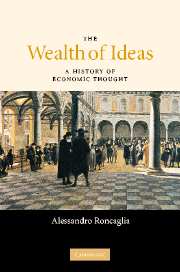Book contents
- Frontmatter
- Contents
- Preface
- 1 The history of economic thought and its role
- 2 The prehistory of political economy
- 3 William Petty and the origins of political economy
- 4 From body politic to economic tables
- 5 Adam Smith
- 6 Economic science at the time of the French Revolution
- 7 David Ricardo
- 8 The ‘Ricardians’ and the decline of Ricardianism
- 9 Karl Marx
- 10 The marginalist revolution: the subjective theory of value
- 11 The Austrian school and its neighbourhood
- 12 General economic equilibrium
- 13 Alfred Marshall
- 14 John Maynard Keynes
- 15 Joseph Schumpeter
- 16 Piero Sraffa
- 17 The age of fragmentation
- 18 Where are we going? Some (very tentative) considerations
- References
- Index of names
- Subject index
9 - Karl Marx
Published online by Cambridge University Press: 22 September 2009
- Frontmatter
- Contents
- Preface
- 1 The history of economic thought and its role
- 2 The prehistory of political economy
- 3 William Petty and the origins of political economy
- 4 From body politic to economic tables
- 5 Adam Smith
- 6 Economic science at the time of the French Revolution
- 7 David Ricardo
- 8 The ‘Ricardians’ and the decline of Ricardianism
- 9 Karl Marx
- 10 The marginalist revolution: the subjective theory of value
- 11 The Austrian school and its neighbourhood
- 12 General economic equilibrium
- 13 Alfred Marshall
- 14 John Maynard Keynes
- 15 Joseph Schumpeter
- 16 Piero Sraffa
- 17 The age of fragmentation
- 18 Where are we going? Some (very tentative) considerations
- References
- Index of names
- Subject index
Summary
Introduction
The analytic structure based on the notion of surplus and representation of the economic system as a circular flow of production and consumption, developed by the classical economists, and in particular by Ricardo, was taken up and utilised in an original way by Karl Marx (1818–83). He focused his analysis on the clash of interests between the bourgeoisie and the proletariat, his researches in the economic field being guided by a dominant political aim, namely radical criticism of the capitalistic mode of production. His frame of thought also reflected the influence of Hegelian philosophy (in particular that of the so-called Hegelian left – Ludwig Feuerbach, Bruno Bauer and Max Stirner) and French anti-capitalistic currents (from Babeuf and Buonarroti to Proudhon).
Thus, as we will see in more detail in the following pages, with his theory of alienation in the first phase, and later on with his theory of commodity fetishism, Marx proposed a critique of the division of labour in capitalistic society. Furthermore, with his theory of exploitation, Marx sought to show that profits stem from ‘unpaid work’ even in a system that adheres to the capitalistic criterion of justice – exchange of equals – where the two parties to exchange give and receive equal values.
In developing this thesis, Marx adopted the labour-contained theory of value.
- Type
- Chapter
- Information
- The Wealth of IdeasA History of Economic Thought, pp. 244 - 277Publisher: Cambridge University PressPrint publication year: 2005



